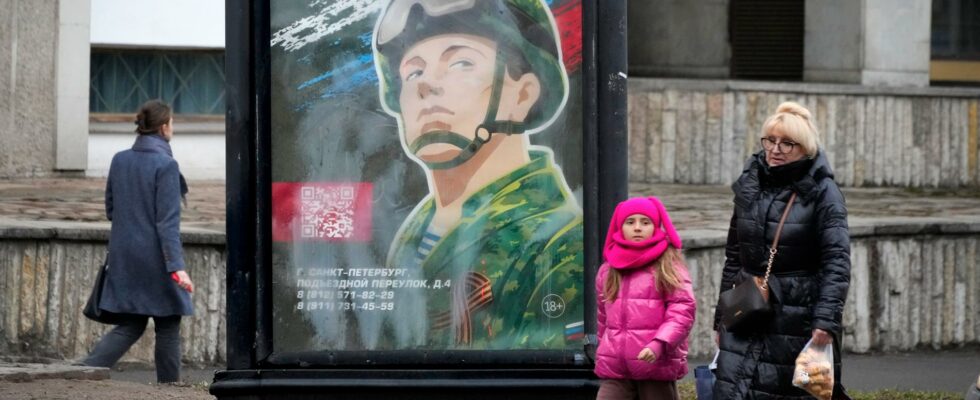unsaveSave
expand-left
full screen St. Petersburg residents walk past a poster advertising military service in March 2023. Photo: AP/TT
Thousands of foreign soldiers have been offered Russian passports – which they hoped would be the ticket to money and freedom. Instead, they were chained to the front.
– Now they say that because we are Russian citizens, we must fight until the end of the war, says Cuban Jorge to Politico.
Jorge is in Kursk. He is one of thousands of foreigners who signed a one-year contract with the Russian army in exchange for high pay and a fast track to Russian citizenship. But the agreement comes with a catch.
– They won’t let us go, says Manuel, who, like other foreign recruits, had his passport confiscated before he was sent to the front.
Politico has interviewed four Cubans fighting for Russia, all under pseudonyms, as well as family members of another five. The stories are consistent. And without documents, the situation is hopeless.
– They are in the hands of the (Russian) Ministry of Defense, notes Ivan Chuviliajev at the legal organization Idite Lesom, which helps Russians flee the front.
Poster boys
According to Ukraine, the number of foreign soldiers in the Russian army is growing day by day. They largely come from poorer countries: Cuba, Nepal, Ghana, Syria, India, Sri Lanka, Somalia. For Russia, whose forces are exhausted after almost three years of war, they are indispensable.
But the foreigners also serve another purpose: they are poster boys for “international solidarity” and the idea that Russia leads a broad coalition of countries fighting US and NATO supremacy.
However, few of those who survived seem to have chosen to fight on ideological grounds. Instead, it’s about money: a chance to break free from poverty and to create a better life for themselves and their families. Some claim not to have understood the terms.
– There were no jobs in Nepal. We did not understand that we would be sent to the front line so quickly and how dire the situation was, Ramchandra Khadka, one of probably thousands of Nepalis recruited by Russia, told CNN last year.
Hardly enough milk
A Sierra Leonean man named Richard tells The Insider that he went to Russia to fulfill his daughter’s dream of becoming a doctor. Once there, he was asked to sign a contract.
– Nobody asked me if I wanted to join the army or not. The papers were in Russian and I didn’t understand what they said. All they needed was my signature.
César, from Cuba, was 19 when he spoke to Politico in September 2023. At the time, he was about to fly to Moscow. In Cuba, ruled by an authoritarian regime under heavy US sanctions, wages were barely enough for milk and toilet paper.
– Here you can be a nuclear physicist and still die of hunger, he said.
– If this is the sacrifice I have to make for my family to be well, then I will do it.
FACTS Attracted with citizenship
Since the start of the war in February 2022, Russia’s headquarters of power, the Kremlin, has put forward the framework for foreign soldiers through a series of new decrees. At the same time, the requirements for recruitment have been lowered.
Among other things, the recruits are promised lucrative salaries (often equivalent to just over SEK 20,000 a month, according to media reports) plus bonuses, extensive social benefits and citizenship. According to a Russian decree from early 2024, a one-year contract with the military gives the right to Russian passports, which also applies to the spouses, children and parents of the recruits.
Ukrainian authorities claimed last year that tens of thousands of “African and Asian citizens” are fighting on the Russian side.
Many foreign soldiers have either been killed or captured by Ukraine, according to authorities in the respective countries and numerous media reports. With Russia rarely said to want to include them in prisoner exchanges, and some risking imprisonment at home if they return, they often end up in limbo.
Sources: CNN, The Kyiv Independent, Ukrainian military, Russian Duma, and more.
Read more
